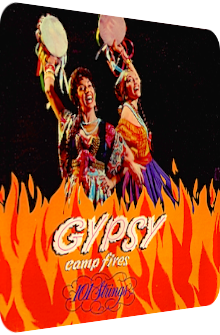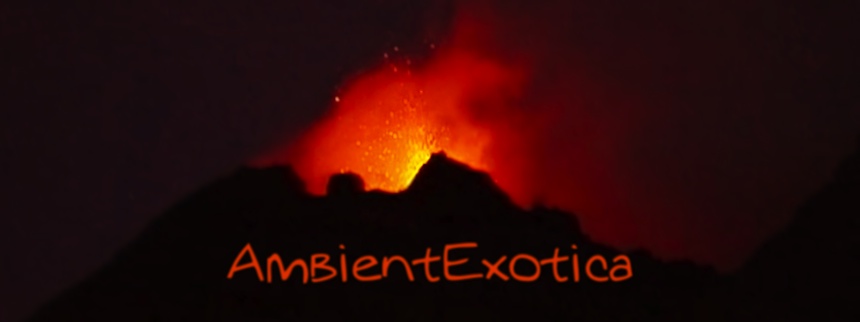
101 Strings
Gypsy Campfires
1958
The 101 Strings are more of a brand than a band, having visited every genre, style and craze from the 50’s onwards. Their first sparkler A Night In The Tropics (1957) was an accidental Exotica artifact of the symphonic kind, but the hundreds of subsequent albums released by the ever-changing collective are few and far between. Not every object is of value to the Easy Listening and Exotica aficionado. And now it comes down to this: Gypsy Campfires belongs to neither category!
Released in 1958 on David L. Miller’s Somerset label, Gypsy Campfires is a six-track LP whose sparse selection of compositions allows for larger – gigantic by Easy Listening standards – sections and segments, with the runtimes of the presentations crossing the mark of five minutes more often than not. Being inspired by Romani folk tunes and the mysterious aura that surrounds the so-called gypsy movements, the album promises freedom, independence… and partial authenticity. The six tracks are all based on traditional music or comparably old and thus truly classic material. Strings you can expect alright, but there are also flutes, accordions and tramontane guitars embroidered in the soundscape. Mixed vocals, mostly of enchantresses, are sewn into the sceneries and reappear time and again. There is a reason for this album to appear at the Exotica Review section, and granted, it is no good reason to be honest, but I guess it doesn’t hurt to jump the shark once in a while – unless one happens to fall back on one’s feet. Here is an in-depth review about a curious gem.
There is no rule which prevents an Easy Listening album from venturing into the murkier side, the shadier interstices, the twilight hours, but all the moon-related titles and darkly romantic sparklers aside, the opener Dark Eyes, based on a traditional melody that has been resurrected and interpreted by lots of composers, is mightily arcane: a male choir hums along to whirling string cascades, appended harp helixes and mucoid double bass bumps, and granted, there must be shifting tempos and lead fiddles to fully encapsulate the cliché level in regard to the presumed compunction gypsies are entrapped in. Ranging from Tarantella metrics over – admittedly gorgeously texturized – accordion segues to mixed choir-fueled eruptions of rufescent elation, Dark Eyes is pompously over the top and polyfaceted, multiplexing cavalcades of sound, sustain and silence showcasing various surfaces.
Antonín Dvořák’s Slavonic Dances is up next, and while it does not completely comes out of the shadow, it is usually used to emanate a heavily bubbling insouciance that comes with the kind of freedom these rustic folks seem to have made their primary force, figuratively speaking. Blotchier and more pointillistic, with legato clarinets, sylvan syrinxes, bucolic bugles and the mandatory pizzicato strings, the choir-accentuated classic is a wild ride through bosky ceremonies and love of life. Two Guitars then rounds off side A with a great focus on the titular instruments. It doesn’t take a genius to arrange the traditional theme in that way, but during the long-winded journey of almost six minutes, the 101 Strings tremble from delicately harpsichord-esque heterodyned guitars, histrionic and downright apocalyptic choir outbursts to murky phases of reflection in hatched colors. Even the sizzling percussion aorta and the oompa rhythm cannot annihilate the heavy gravitas.
Side B launches with Johannes Brahms’ famous Hungarian Dance No. 6, and given that this was written in the 19th century, the low-level exoticism – at least that of the tropical kind – is further diminished via bumblebee strings, their aureate pizzicato foils and a legato veil of icy complexions. The simultaneity of the different styles of play create a horticultural cannelure which feels less grave and supercharged than the serious overtones might let one think. Whether it is the short mirages of a bonfire accordion or the choir hailing from behind in the arrangement’s mountainous naturalistic endpoint, the interpretation by the 101 Strings is a dead serious artifact, nurturing wideness only to then condense it in seething sequences of togetherness.
Up next is Golden Earrings, originally written by Victor Young, Ray Evans and Jay Livingston in the 1940’s, a time that is very far away from today’s contemporary convenience, yet close enough, I presume, to cautiously revive a certain Hollywood glint in the album, one which runs as a golden thread through most LP’s of the orchestra. The strings resemble saccharified fountains, only partially flowing back to darker spirits but otherwise nurturing the mood. There is one important thing to note: the duration of eight minutes. It allows a wide textural range: soothing flutes, Sicilian guitars, fairy tale tonalities and a festive undercurrent which is further augmented by the female vocalists. This composition, for once, has a happy ending. Gypsy Song No. 4 by Antonín Dvořák, meanwhile, further augments the reticulation of bliss in a feisty, effervescently diaphanous apotheosis of majestic fanfares, accordion acatalepsies and Waltz counterpoints, making good use of the signature instruments such as the gypsy lute (patent pending), frilly flutes and harp protrusions.
For the Exotica fan, the 101 Strings’ Gypsy Campfires is as suitable as a Doom Metal album of one’s choice, so why the heck did it appear on AmbientExotica? That’s a good question, one which I cannot answer in an erudite way. Naturally, collectors of Exotica and followers of the 101 Strings will become aware of this dark opalescent gem sooner or later, even if they just know of the existence, not the arrangements or contents themselves. But let me assure you that Gypsy Campfires has its merit, even if it rightfully resides in the lower regions of Exotica’s must-have list… if it appears on such an academic list at all. David L. Miller’s string brand offers a different kind of escapism and exoticism, one which is curiously and unexpectedly much darker than Hugo Winterhalter’s take on the genre called Hugo Winterhalter Goes Gypsy (1960).
Miller, his arrangers and ensemble open a rift through time and space, if not in the scientific sense, then all the more so in the primary aesthetic regard. Never have the 101 Strings sounded so sincere, serious and heavy. The lack of material – it is just six compositions – allows for more developed and sophisticated sections and interpretations. This not only kills the Easy listening factor off completely, it also leads to a patchwork of sections, for better or worse. Ambient preludes turn to Waltz segues which themselves are paths to a Tartarean darkness. I cannot fool the connoisseur and don’t want to tell bogus to Exotica fans in general, so let’s just say that Gypsy Campfires offers a viewing angle on the gypsy theme that is as dedicated and truthful as can be in the given surroundings. This is, after all, a product of the entertainment industry, so it has its obvious flaws in terms of authenticity, a word rarely used, nor wanted in Exotica music, but David L. Miller has greenlit a wondrous ignis fatuus here, one which is remarkable for all the reasons Exotica fans do not seek. Maybe that is its primary achievement. Gypsy Campfires is available on various vinyl editions and as a remastered digital version.
Exotica Review 377: 101 Strings – Gypsy Campfires (1958). Originally published on Sep. 27, 2014 at AmbientExotica.com.
